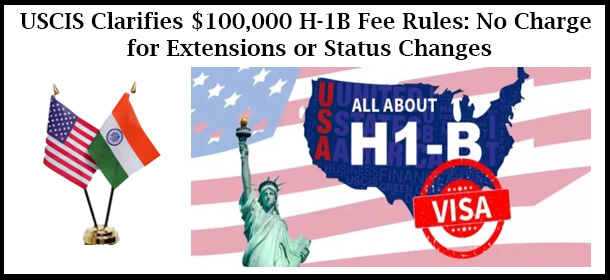USCIS Clarifies $100,000 H-1B Fee Rules: No Charge for
Extensions or Status Changes

Los Angeles/Oct 21, 2025
NRIpress.club/Ramesh/ A.Gary Singh
The U.S. Citizenship and Immigration Services (USCIS) has issued fresh guidance clarifying who must pay the controversial $100,000 H-1B visa fee, how the payment process works, and under what conditions employers may seek an exemption.
The fee originated from a presidential proclamation signed on September 19, 2025, which left employers and immigration attorneys uncertain about its application. The confusion led to multiple lawsuits, including one filed by the U.S. Chamber of Commerce on October 16, 2026, following an earlier legal challenge from a coalition of businesses and universities on October 3, 2025.
Clarifying When the Fee Applies
In its October 20, 2025 guidance, USCIS explained that the fee applies only to new H-1B petitions filed on or after September 21, 2025, for beneficiaries outside the United States who do not already hold a valid H-1B visa.
According to immigration attorney Dan Berger of Green & Spiegel, “The fee applies only to cases filed for people outside the U.S., so they can come in. Employers were nervous about status changes because the $100K might apply if they travel.”
USCIS confirmed that the fee will not apply to individuals already inside the U.S. seeking a change of status (for example, from F-1 student to H-1B worker) or requesting an extension or amendment of their current stay. The agency also clarified that even if such an employee later travels abroad and reenters using the same H-1B approval, the fee will still not apply.
However, if USCIS determines that a person is ineligible for a status change or extension—such as when the applicant is out of valid status or leaves the country before adjudication—the $100,000 fee would become applicable.
Payment Procedure Announced
For the first time, USCIS has outlined how employers must make the payment. Petitioners should submit the $100,000 fee through pay.gov, using the form titled “H-1B Visa Payment to Remove Restriction.”
The guidance also reiterates that the fee does not apply to petitions filed before September 21, 2025, or to previously issued valid H-1B visas, ensuring that current visa holders and their employers are unaffected.
Exception Requests and National Interest Criteria
USCIS also described the process for requesting an exception to the payment. While the original proclamation allowed the Secretary of Homeland Security to waive the fee for reasons of national interest, USCIS has added several limiting conditions.
Exceptions will only be granted in “extraordinarily rare circumstances,” where the Secretary determines that:
- The worker’s presence serves a significant national interest,
- No qualified U.S. worker is available for the role,
- The worker poses no security or welfare risk, and
- Requiring the fee would undermine U.S. interests.
Employers who wish to apply for such an exception must email H1BExceptions@hq.dhs.gov with all supporting evidence.
Industry Reaction
While the updated USCIS guidance answers some key employer concerns—particularly around status changes and extensions—immigration experts say the rules remain restrictive and may still discourage companies from hiring global talent.
Despite clarifications, many in the business and academic communities view the $100,000 H-1B fee as a significant barrier, arguing it could harm America’s competitiveness in attracting high-skilled foreign professionals, especially given that 73% of full-time graduate students in U.S. electrical and computer engineering programs are international students.
NEWS SOURCE: CLICK HERE

|